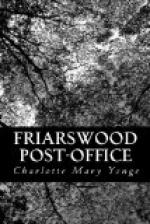CHAPTER XI—BETTER DAYS FOR PAUL
Paul’s reading was a great prize to Alfred, for he soon grew tired himself; his sister could not spare time to read to him, and if she did, she went mumbling on like a bee in a bottle. Her mother did much the same, and Harold used to stumble and gabble, so that it was horrible to hear him. Such reading as Paul’s was a new light to them all, and was a treat to Ellen as she worked as much as to Alfred; and Paul, with hands as clean as Alfred’s, was only too happy to get hold of a book, and infinitely enjoyed the constant supply kept up by Miss Selby, to make up for her not coming herself.
Then came the making out the accounts, a matter dreaded by all the family. Ellen and Alfred both used to do the sums; but as they never made them the same, Mrs. King always went by some reckoning of her own by pencil dots on her thumb-nail, which took an enormous time, but never went wrong. So the slate and the books came up after tea, one night, and Ellen set to work with her mother to pick out every one’s bill. There might be about eight customers who had Christmas bills; but many an accountant in a London shop would think eight hundred a less tough business than did the King family these eight; especially as there was a debtor and creditor account with four, and coals, butcher’s meat, and shoes for man and horse, had to be set against bread, tea, candles, and the like.
One pound of tea, 3s. 6d., that was all very well; but an ounce and a half of the same made Ellen groan, and look wildly at the corner over Alfred’s bed, as if in hopes she should there see how to set it down, so as to work it.
‘Fourpence, all but—’ said a voice from the arm-chair by the fire.
Ellen did not take any particular heed, but announced the fact that three shillings were thirty-six pence, and six was forty-two. Also that sixteen ounces were one pound, and sixteen drams one ounce; but there she got stuck, and began making figures and rubbing them out, as if in hopes that would clear up her mind. Mrs. King pecked on for ten minutes on her nail.
‘Well,’ she said, ‘Paul’s right; it is fourpence.’
‘However did you do it?’ asked Ellen.
‘As 16 to 1.5, so 42,’ quoth Paul quickly. ’Three halves into 42; 21 and 42 is 63; 63 by 16, gives 3 and fifteen-sixteenths. You can’t deduct a sixteenth of a penny, so call it fourpence.’
Ellen and Alfred were as wise as to the working as they were before.
Next question—Paul’s answer came like the next line in the book— Mrs. King proved him right, and so on till she was quite tired of the proofs, and began to trust him. Alfred asked how he could possibly do such things, which seemed to him a perfect riddle.
’I should have had my ears pretty nigh pulled off if I took five minutes to work that in my head,’ said Paul. ’But I’ve forgotten things now; I could do it faster once.’




